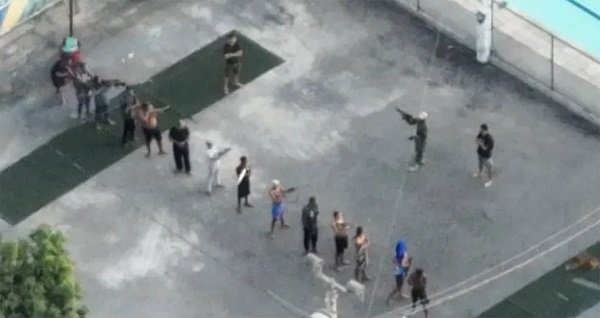An investigation by Rio’s Civil Police revealed the existence of a training center for drug traffickers in Complexo da Maré, North Zone. The investigation, which lasted two years, is the largest ever carried out on the actions of two criminal groups — drug traffickers and militia — that dispute control of territories in the region.
This Content Is Only For Subscribers
To unlock this content, subscribe to INTERLIRA Reports.
Investigators took hundreds of hours of footage using drones. In one of the sequences, it is possible to see two instructors teaching groups of 15 to 20 men armed with tactical rifles to attack and defend themselves using heavy weapons. The war exercises take place in an area that could serve as leisure for the community, on a football court with a swimming pool, next to a daycare center and five municipal schools, but are for the exclusive use of criminals.
Location
The training space is on the banks of Guanabara Bay and a few meters from the three main expressways that cross the city: Avenida Brasil, Linha Amarela and Linha Vermelha, on the route to Galeão international airport and the Federal University of Rio de Janeiro (UFRJ), and where there is also a Military Police battalion.
How Training Works
Training is carried out in stages, according to investigations. In part of the police report, the phases of these classes are highlighted, which begin with joint stretching. After stretching and a period of push-ups, the traffickers start to run in circles on the field. While they do this, they hold rifles, as indicated in the Brazilian Army training manual. At dusk, the criminals, trained by two instructors, move on to the tactical progression stage — where bombs are used to simulate an armed confrontation scenario, a technique used in police raids in conflagrated areas.
Joint Action Between State and Federal Forces
Rio de Janeiro governor, Cláudio Castro, met with the public security leadership on Thursday (28/09) morning to align the main points to be discussed regarding the actions of state and federal forces in the state. On Wednesday, the federal government had already announced that it will offer to send men from the National Security Force to combat trafficking in Complexo da Maré.
Military occupation
Between 2014 and 2015, the Army and Navy occupied the group of favelas for 14 months with the mission of pacifying the region for the installation of a Pacifying Police Unit, in an operation that cost R$600 million.
Analysis:
The difficulty of combating crime within communities is historic and a series of factors contribute to that. In addition to the resistance of the population to the presence of police, the local geography does not help. With buildings set in a pattern that almost form maze, narrow streets and alleyways, sloped and marshy terrains, the challenge of moving through the communities is great and favors those holding the territory. However, police forces still hold an advantage, specialized training; while the adversary is often made up of young and untrained men. In this way, professional training provided to criminals could give them greater power to confront both the state and adversaries, increasing risks to the common population near the conflict zones.




